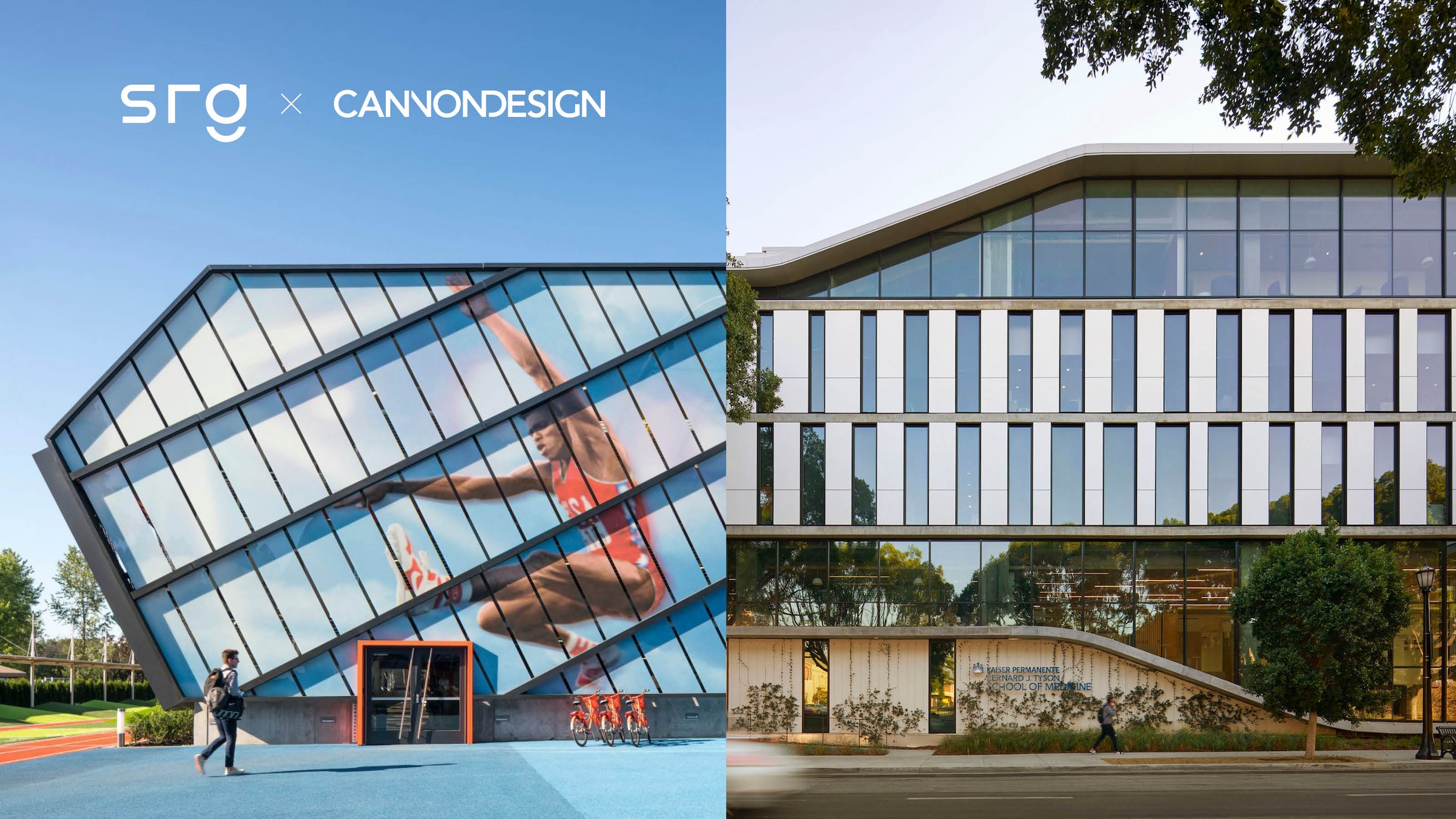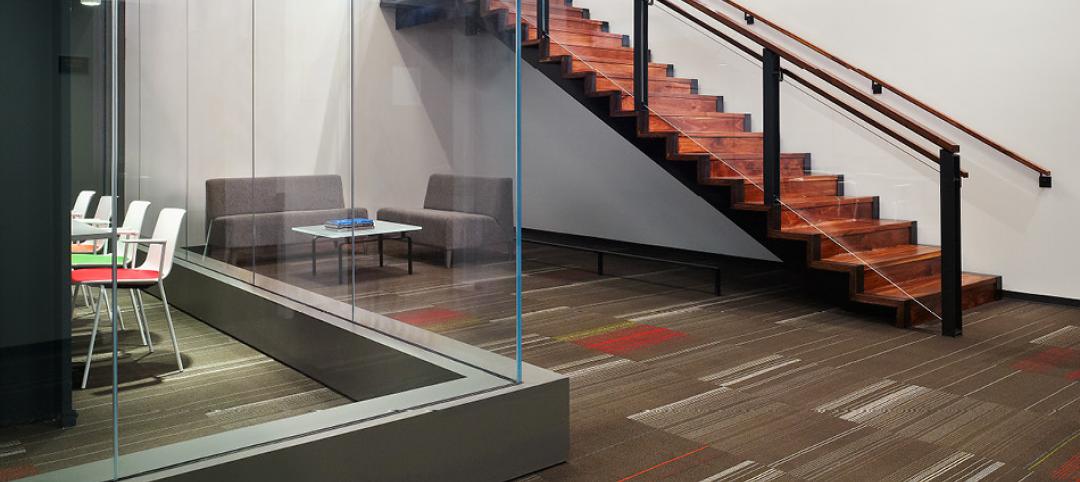SRG Partnership, a dynamic architecture, interiors and planning firm with studios in Portland, Oregon, and Seattle, Washington, has joined CannonDesign. This merger represents not only a fusion of businesses but a powerhouse union of two firms committed to making a profound difference through design.
Both SRG Partnership and CannonDesign share a commitment to designing places that help people, communities and the environment flourish. Together, the firms will amplify their impact throughout the Pacific Northwest and across the country, setting new standards for transformative design for health and wellness, education, science and technology, sports and recreation, and culture.
Going forward, SRG Partnership will be known as SRG + CannonDesign. With the addition of SRG’s Portland and Seattle studios, CannonDesign now has 18 offices and nearly 1,300 teammates across North America and India.
“SRG Partnership defines itself with a statement—Invent a better future—that truly resonates with me,” says CannonDesign’s CEO Bradley Lukanic, AIA. “Partnering with this established design firm is a wonderful start to the year. The alignment and focus between our firms will drive us forward; together we’re going to create positive impacts with design excellence in and outside of our communities.”
SRG has a storied history in the Pacific Northwest spanning more than 50 years. Led by President Lisa Petterson, the firm is recognized for its commitment to crafting deeply sustainable buildings that enhance the quality of life. Its more than 60 employees have led award-winning projects of all scales, from the Oregon Health & Science University Knight Cancer Research Building to Hayward Field at the University of Oregon, the Multnomah County Central Courthouse and the Center for Behavioral Health and Learning at the University of Washington, among others.
“SRG has been making an impact consistently, but we recognize we can achieve even greater growth and impact alongside CannonDesign,” noted Petterson. “The alignment in our cultures, commitment to diversity and emphasis on sustainability is striking. CannonDesign’s Living-Centered Design ethos also beautifully aligns with our purpose to leave a lasting impact on communities. I’m genuinely excited about the new opportunities this merger brings to our people, clients and the communities we design for.”
CannonDesign is a design solutions firm at the nexus of architecture, strategy, experience, interior design, engineering and social impact. The firm is consistently recognized by Fast Company as one of the most innovative companies in the world, designing buildings, experiences and strategies for esteemed organizations such as Mayo Clinic, Memorial Sloan Kettering, LinkedIn, Oak Ridge National Laboratory, Under Armour, University of Chicago Medicine, CalTech and more.
"There's a clear synergy in our firms’ shared commitment to design excellence,” added David Polzin, CannonDesign’s Executive Director of Design. “SRG’s portfolio is outstanding, both regionally sensitive and transcendent of place. Their teams’ dedication to being environmentally responsible, resilient and equitable is evident in their work. I’m looking forward to designing a brighter future together.”
Learn more at www.cannondesign.com and www.srgpartnership.com.
Related Stories
| Jun 25, 2013
First look: Herzog & de Meuron's Jade Signature condo tower in Florida
Real estate developer Fortune International has released details of its new Jade Signature property, to be developed in Sunny Isles Beach near Miami. The luxury waterfront condo building will include 192 units in a 57-story building near high-end retail destinations and cultural venues.
| Jun 25, 2013
DC commission approves Gehry's redesign for Eisenhower memorial
Frank Gehry's updated for a new Dwight D. Eisenhower memorial in Washington, D.C., has been approved by the Eisenhower Memorial Commission, reports the Washington Post. The commission voted unanimously to approve the $110 million project, which has been gestating for 14 years.
| Jun 21, 2013
AIA report: Greater collaboration, stiffer competition among top trends in architecture
A new 34-page report from AIA highlights key trends in the architecture marketplace and their impact on business and growth.
| Jun 20, 2013
Virtual meetings enhance design of University at Buffalo Medical School
HOK designers in New York, St. Louis and Atlanta are using virtual meetings with their University at Buffalo (UB) client team to improve the design process for UB’s new School of Medicine and Biomedical Sciences on the Buffalo Niagara Medical Campus.
| Jun 19, 2013
Architects upbeat about the construction market
Following the first reversal into negative territory in ten months in April, AIA's Architecture Billings Index bounced back in May, reaching 52.9.
| Jun 19, 2013
NSF Sustainability begins verifying EPDs that can be used for LEED V4
NSF Sustainability has verified Environmental Product Declarations (EPDs) for nylon carpet styles and colors manufactured by Mannington Commercial and for J+J Flooring Group’s Kinetex® flooring product and Invision brand modular styles that use eKo® backing.
| Jun 19, 2013
Florida is latest battleground over LEED standards centered on certified wood
A nationwide battle over forest certification standards continues to be played out nationally and in Florida with legislation passed this month.
| Jun 19, 2013
Construction site safety improved in 2011
On-the-job construction fatalities dropped from 802 in 2010 to 781 in 2011, and recordable injuries fell from 4.7 per 100 workers in 2008 to 3.9 per 100 in 2011, according to data from the Bureau of Labor Statistics.
| Jun 19, 2013
New York City considers new construction standards for hospitals, multifamily buildings
Mayor Michael Bloomberg’s administration has proposed new building codes for hospitals and multifamily dwellings in New York City to help them be more resilient in the event of severe weather resulting from climate change.
| Jun 18, 2013
Report: HVAC occupancy sensors could slash building energy demand by 18%
Researchers at the DOE's Pacific Northwest National Laboratory conclude that significant energy savings can be achieved by varying ventilation levels based on the number of people in a given space.
















